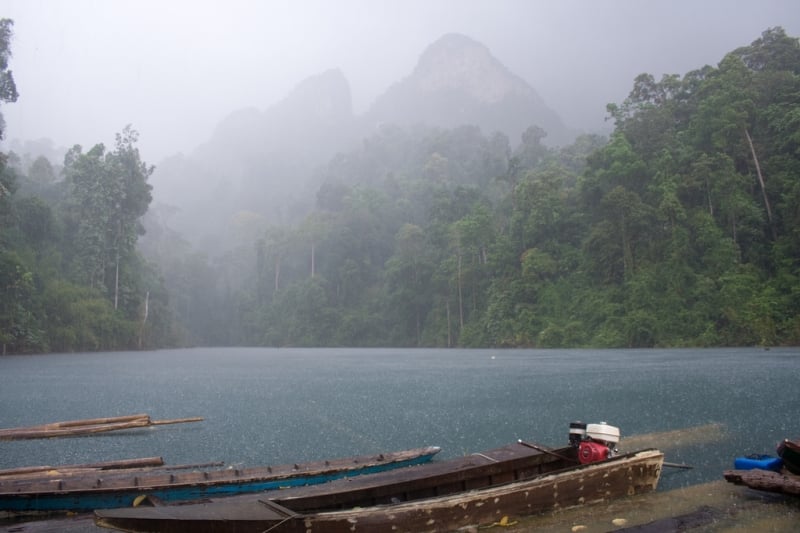While many people may be put off from visiting Thailand during the rainy season, this is when the hot, tropical country is at its most verdant. Rural landscapes are transformed into a burgeoning blanket of green, rivers rise, and waterfalls flow at their fullest.
Also known as the monsoon season, the rainy season occurs at different times depending on the part of the country. In Central, Northern, Northeastern, and Eastern Thailand, the rainy season is usually from May to November, with August and September often being the wettest months. In Southern Thailand, the rainy season is different for each coast. Along the Andaman Coast, the rains usually come between April and October. The rainy season along the Gulf Coast is typically between September and December.

Image credit: wdso
Rains and thunderstorms are, as you would expect, common during the rainy season. Skies can get dark and overcast very quickly, lightning streaks through the clouds, and thunder booms and roars. The rain can come down heavily, and with little warning. Storms and downpours are usually relatively short, however, with the rest of the day often drying out. Visitors can still enjoy warm and sunny conditions on most days.
If you do plan to visit Thailand in the rainy season, here are some useful tips for during your stay:
1. Always be prepared for rain
As rains can come with little warning, make sure that you head out for a day’s sightseeing prepared for a soaking. If you’re in a town or city it’s usually quite easy to duck inside a museum, temple, market, or restaurant to wait for downpours to subside. Carrying an umbrella can make life more comfortable in a drizzle, however, and means that you can continue to wander around and explore without getting wet.
An inexpensive rain poncho, available from many stores around Thailand, can also be an ideal way to stop splashes and keep your hair dry. Of course, they’re not designed for stormy weather, though; they just add some protection against the elements in lighter rains. A light-weight rain jacket is a great addition to a packing list for people who plan to spend a lot of time outside.
2. Protect your possessions
A quick and easy way to add a little extra protection to items in your bag is to line the inside of your bag with plastic carrier bags and place your day-to-day things inside a layer of plastic. Your bag will still get wet, but the things inside should stay dry. Plastic rain covers are available for larger bags, such as backpacks. You could also consider investing in a waterproof bag for complete protection. Leave any items you don’t need in your hotel room before heading out for the day.
3. Wear sensible footwear
The rainy season is still hot and humid, and it can be tempting to throw on a pair of flip flops for days out and about. These are not very practical during rainy periods, though, as they can increase the risk of slipping. Flip flops and wet floor tiles really aren’t a great match! Wear sandals that provide at least a little grip and that fasten surely to your feet.
4. Re-think motorbike trips
While many travellers love the independence of renting a scooter to explore Thailand, the rainy season really isn’t the best time to take to the roads, especially if you are an inexperienced rider. Visibility can be drastically reduced, the road surfaces can quickly become slippery or even flooded, and shelter can be minimal, particularly on rural or mountain roads.
5. Pack leech socks
If your vacation includes jungle trekking, pack a pair of leech socks. Leeches love wet weather and can be a major annoyance in the jungles and forests.
6. Use mosquito repellent
Mosquito numbers increase sharply during the rainy season. As well as being a nuisance, mosquitoes can spread diseases. It’s important to take steps to prevent bites. Apply mosquito repellent regularly, especially during the evening. Long pants and a long-sleeved top can also help to avoid being bitten. Mosquito coils can be useful for evenings spent sitting outside, whether in an open-air restaurant, by a river, on a beach, or on your balcony.
7. Check weather reports
Of course, nobody can completely rely on the accuracy of weather forecasts, but having a rough idea of the expected weather conditions for a day out can help you plan your activities. Do also check for any weather alerts before moving to another destination; you don’t want to travel across the country to find out that a certain area is experiencing flooding.
6. Pay heed to warnings
Don’t ignore any warnings during the rainy season; they’re issued for your safety. For example, if certain areas of a waterfall are closed off to the public, don’t be tempted to sneak behind barriers for a better view. Look for swim and surf warnings on beaches before taking a dip in the ocean. Undercurrents and rip tides can be incredibly strong.
9. Look out for jellyfish
Even in places where it’s fine to swim, jellyfish can be present in the waters. Although jellyfish can be present all year round, they are especially prevalent during the monsoon season; the rainy season brings them closer to shore. Check the waters for jellyfish before entering. Some jellyfish are harmless, some give a nasty sting. The dangerous box jellyfish have also been seen off the coast of Thailand. It’s better to be safe than sorry! If the lure of the sea is too much, you could consider wearing a long lycra bodysuit for swimming to prevent strings. These are especially recommended for people going snorkelling. Underwater visibility isn’t so great, however, during the rainy season, so you many want to give snorkelling a miss altogether.
10. Expect delays and cancellations
Although downpours generally don’t affect most of Thailand’s transportation systems too much, floods can lead to road closures and delays on buses. Ferries and boats may be delayed or cancelled, making getting to and from islands unpredictable. Factor in possible delays to your plans.
A holiday in Thailand is often filled with terrific experiences all year round, and people certainly shouldn’t be deterred from visiting during the wet season. It does, though, pay to plan a little more and be prepared for the weather to make your trip as comfortable as possible.





